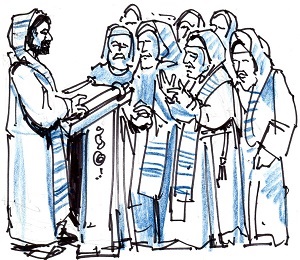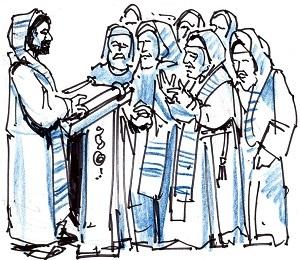

“You received the word of God … which is now at work in you who believe’ (1 Thessalonians 2:13).
1 Thes 2:9-13; Matt 23:27-33
Today’s two readings provide us with a sharp contrast in the way different groups received the word of God. Paul rejoices that Gentile believers in Thessalonica have opened their hearts and minds to the Spirit. The Word he preached to them is transforming their lives. Clearly, a power far greater than human wisdom or even Paul’s persuasion is at work. It is no wonder Thessalonica is one of Paul’s dearest faith communities.
In contrast, Matthew describes Jesus’ frustration with learned scholars and religious leaders in Jerusalem who should have welcomed the Good News. Instead they have closed their minds and hearts to the Spirit. Despite their knowledge of the Scriptures and official positions, the scribes and Pharisees seek to kill Jesus. Matthew quotes Jesus excoriating them for being hypocrites and so corrupt they are like whitewashed tombs full of dead men’s bones. He accuses them of being complicit with their ancestors in killing the prophets, then building monuments to honor them.
The rhetorical ferocity of these accusations may reflect later tensions between the early church and the rabbinic councils that survived the destruction of Jerusalem and the temple. The rabbis ousted Jewish followers of Jesus and were spreading their own accusations that he was a heretic and a law breaker. All the evangelists ramped up their defense of Jesus and counter attacks on his critics. The toxic residue of these attacks in the New Testament made it easier to caricature Judaism, with catastrophic results in church history.
Jesus’ nonviolence and emphasis on reconciliation suggests that he went to great lengths to dialogue with his opponents, trying to draw them into a shared acceptance of love, not legalism, as the heart of the Law and Prophets. Whatever their case against Jesus, personal or professional, the scribes and Pharisees were welcomed by Jesus into the reign of divine mercy as much as the poor, sinners and other outcasts.
There are few quarrels as fierce as religious ones. People who believe they hold the absolute truth and have God on their side seek absolute victory over others. They often go to extremes to silence and expel anyone who disagrees with them. Ideological wars between traditionalists and progressives can take on this meanness of spirit, but they can claim no authority from Jesus himself, who laid down his life for both his friends and his enemies. A sure sign that the Spirit is at work in real dialogue is that it is characterized by respect and patient love.
Advertisement






